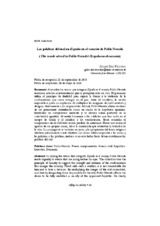Las palabras del mal en España en el corazón de Pablo Neruda
The words of evil in Pablo Neruda’s España en el corazón
Autor
Del Vecchio, Gilles
Editor
UCOPressFecha
2020Materia
Pablo NerudaPoesía comprometida
Guerra civil
República
Invectiva
Denuncia
Committed poetry
Civil War
Republic
Invective
Denunciation
Poésie engagée
Guerre civile
République
Invective
Dénonciation
METS:
Mostrar el registro METSPREMIS:
Mostrar el registro PREMISMetadatos
Mostrar el registro completo del ítemResumen
Al escribir los versos que integran España en el corazón, Pablo Neruda reacciona ante los acontecimientos que se precipitan ante sus ojos. El poemario utiliza el principio de dualidad para sugerir la fuerza y la violencia de la confrontación que causa estragos en el país. Ante tal conflicto, le resulta imposible al poeta no implicarse. Al multiplicar las imágenes del mal cometido y designar directamente a los responsables del mal, Pablo Neruda afirma su deseo de ser plenamente identificado como un aliado de la República oprimida. Reivindica un compromiso militante y se destaca como portavoz de la colectividad agredida. Al rendir homenaje a los soldados que han caído en el campo de batalla y al mitificar a los combatientes, desea estimular el compromiso sin el cual todo estaría perdido de antemano. Hacer uso contra el agresor de sus propias armas, tal es la orientación que estructura la totalidad de la obra. La propaganda es también un arma, y la apropiación del léxico religioso obedece precisamente a este objetivo. Las armas deben responder a las armas y las palabras a las palabras, incluso si en esta lucha feroz deben movilizarse las palabras del mal. In writing the verses that integrate España en el corazón, Pablo Neruda reacts urgently to events that are racing before his eyes. The collection uses the principle of binarity to suggest the strength and violence of the confrontation that ravages the country. Faced with such a conflict, it is not conceivable for him not to take a decision. By multiplying the images of the evil committed, and directly designating those responsible for the evil, Pablo Neruda affirms his desire to be fully identified as an ally of the oppressed Republic. He clearly demands a militant commitment and stands out as spokesperson for the assaulted community. By paying tribute to the soldiers who have fallen on the battlefield and by mythifying the fighters engaged alongside the Republic, he wishes to stimulate the commitment without which everything would already be lost. To turn against the aggressor his own weapons, such is the structuring principle of the collection. Propaganda is also a weapon, and the appropriation of the religious lexicon obeys precisely this objective. Weapons mustrespond to weapons and words to words, even if in this fierce struggle the words of evil must be mobilized. En rédigeant les vers qui intègrent le bref recueil intitulé España en el corazón, Pablo Neruda réagit dans l’urgence face à des événements qui prennent forme et s’emballent sous ses yeux. Le recueil exploite le principe de la binarité et du duel afin de suggérer la force et la violence de l’affrontement qui ravage le pays. Face à un tel conflit, il ne lui est pas envisageable de ne pas se prononcer. En multipliant les images du mal commis, et en désignant directement les responsables du mal, Pablo Neruda affirme sa volonté d’être pleinement identifié comme un allié de la République opprimée. Il revendique clairement un engagement militant et s’impose en tant que porte-parole de la communauté agressée. En rendant hommage aux soldats tombés au champ de bataille et en mythifiant les combattants engagés aux côtés de la République, il souhaite stimuler l’engagement sans lequel tout serait d’ores et déjà perdu. Retourner contre l’agresseur ses propres armes, tel est le principe structurant du recueil. Or, la propagande est également une arme, et l’appropriation du lexique religieux obéit précisément à cet objectif. Les armes doivent répondre aux armes et les mots aux mots, y compris si dans cette lutte acharnée il convient de mobiliser les mots du mal.

